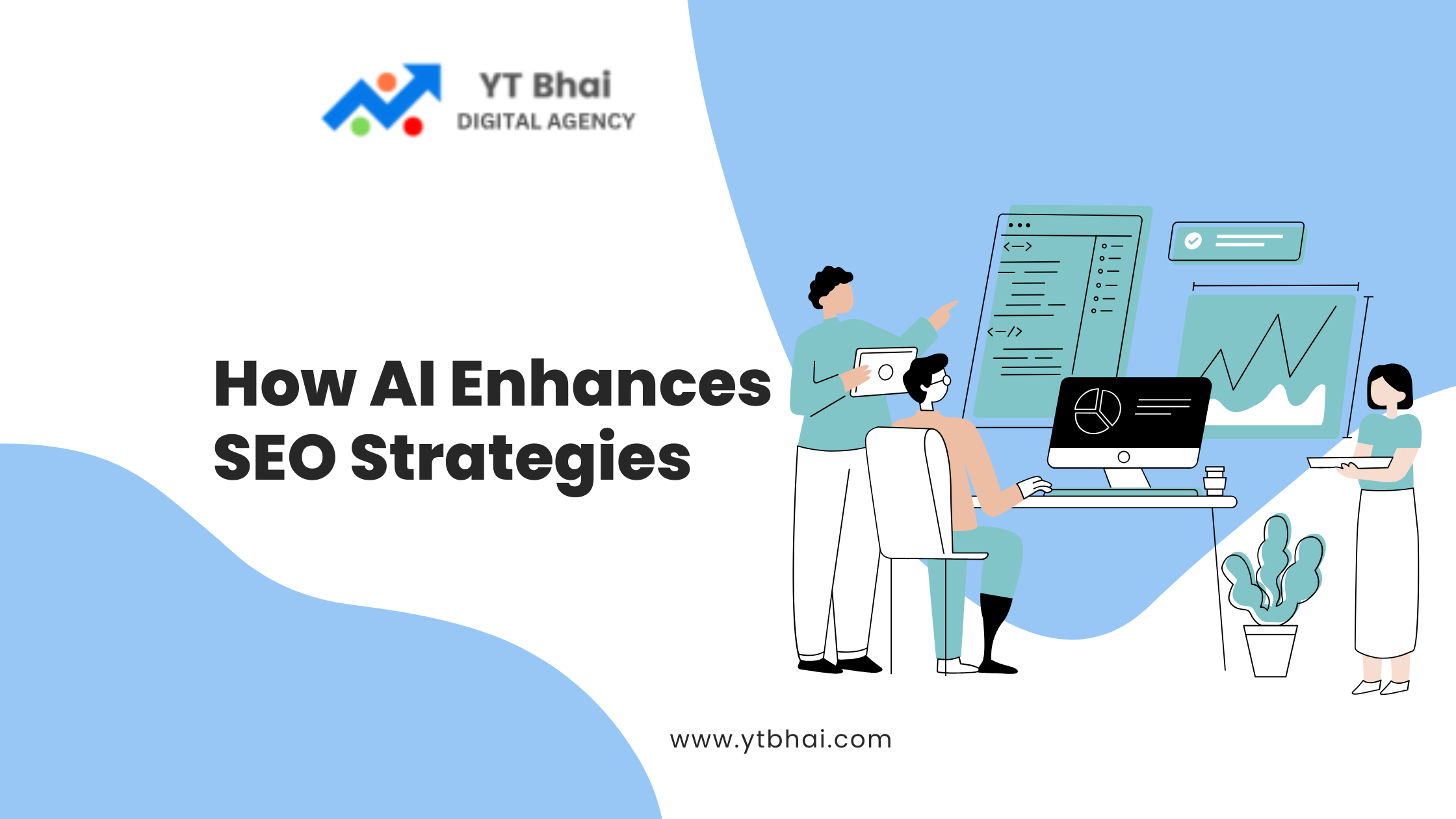
In today’s digital landscape, search engine optimization (SEO) is critical for businesses to enhance their online presence. With the advent of artificial intelligence (AI), SEO strategies have evolved dramatically. AI empowers marketers to analyze data, understand user intent, and implement strategies that drive better results. This blog explores how AI enhances SEO strategies and why it’s a must-have tool for modern marketers.
Introduction to AI in SEO
AI is revolutionizing the SEO industry by automating tasks, providing actionable insights, and improving efficiency. By leveraging machine learning, natural language processing (NLP), and data analytics, AI can help businesses optimize their websites for search engines more effectively.
Key Benefits of AI for SEO Strategies
AI brings several benefits to SEO strategies:
- Efficiency: Automates time-consuming tasks like keyword research and competitor analysis.
- Accuracy: Identifies trends and patterns in user behavior.
- Personalization: Tailors content to match user intent.
- Real-Time Analysis: Monitors and adjusts strategies instantly.
AI-Powered Keyword Research
Keyword research is a cornerstone of SEO, and AI makes it more precise. Tools like Semrush and Ahrefs leverage AI to identify high-performing keywords by analyzing:
- Search volume
- Competition level
- User intent
For instance, AI can identify long-tail keywords that align with specific user queries, improving your chances of ranking higher.
AI in Content Optimization
AI-driven tools such as Surfer SEO and Clearscope help marketers create high-quality, optimized content. These tools analyze top-ranking pages for a specific keyword and provide recommendations, such as:
- Ideal word count
- Keyword density
- Use of headings and subheadings
AI ensures that your content aligns with search engine algorithms while meeting user expectations.
Improving User Experience with AI
Search engines prioritize websites that offer a great user experience. AI enhances this by:
- Personalizing Content: AI algorithms analyze user behavior to display personalized recommendations.
- Improving Page Load Times: AI tools optimize images and scripts for faster load times.
- Enhancing Navigation: AI helps design intuitive website layouts for better user interaction.
AI-Driven Voice Search Optimization
With the rise of voice assistants like Siri and Alexa, optimizing for voice search is crucial. AI helps:
- Understand natural language queries.
- Predict conversational keywords.
- Optimize content for question-based queries.
For example, content that answers “How to” or “What is” questions performs better in voice search.
Predictive Analytics in SEO
Predictive analytics powered by AI provides insights into future trends. Marketers can use these insights to:
- Predict search behavior.
- Identify seasonal trends.
- Optimize campaigns for upcoming changes.
This helps businesses stay ahead of the competition and adjust their strategies proactively.
Enhancing Local SEO with AI
AI simplifies local SEO by analyzing location-specific search patterns. Tools like BrightLocal use AI to:
- Monitor local rankings.
- Optimize Google My Business profiles.
- Identify local competitors and their strategies.
This ensures that businesses remain visible to their target audience in specific geographic locations.
Automating SEO Tasks with AI Tools
AI tools automate repetitive tasks, freeing up time for strategic planning. Some examples include:
| SEO Task | AI Tool | Functionality |
|---|---|---|
| Keyword Research | Ahrefs, SEMrush | Identifies high-performing keywords. |
| Content Optimization | Surfer SEO, Clearscope | Suggests improvements for better rankings. |
| Technical SEO | Screaming Frog, Deepcrawl | Analyzes and fixes website errors. |
| Rank Tracking | Accuranker, SERanking | Monitors keyword rankings in real-time. |
The Future of AI in SEO
AI will continue to play a pivotal role in SEO by integrating advanced technologies such as:
- Augmented Reality (AR): For interactive content.
- Blockchain Technology: For securing user data.
- AI Chatbots: For improving user engagement.
As AI evolves, SEO strategies will become even more data-driven and personalized.
Conclusion
AI has revolutionized the way businesses approach SEO, offering tools and techniques that enhance efficiency, accuracy, and results. By leveraging AI for keyword research, content optimization, user experience improvement, and voice search readiness, marketers can create data-driven strategies that align with search engine algorithms and user intent.
As AI continues to evolve, its role in SEO will only grow stronger, making it an indispensable asset for businesses aiming to improve their online visibility. Whether through automating tasks or predicting future trends, AI empowers marketers to stay ahead in the competitive digital landscape. Embracing AI-driven SEO strategies is not just an option but a necessity to achieve long-term success in the digital era.
FAQs
1. How does AI help in keyword research?
AI identifies high-performing keywords by analyzing search volume, competition, and user intent.
2. Can AI improve website rankings?
Yes, AI enhances rankings by optimizing content, improving user experience, and automating SEO tasks.
3. What is the role of AI in voice search optimization?
AI helps understand conversational queries and optimizes content for question-based searches.
4. Which AI tools are best for SEO?
Popular AI tools include SEMrush, Surfer SEO, Clearscope, and BrightLocal.
5. Is AI essential for SEO in 2024?
Yes, AI is essential for staying competitive in SEO, as it provides insights, automation, and personalization.
